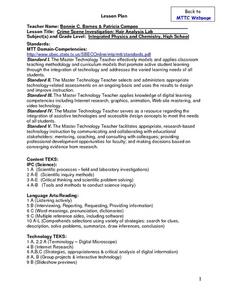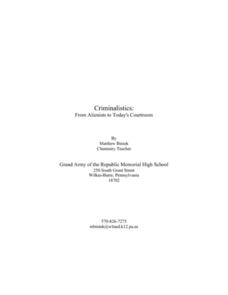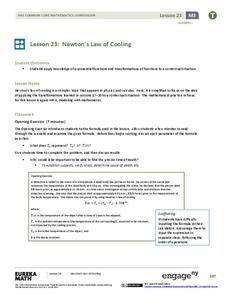Curated OER
Crime Scene Investigation (CSI) with Powdery Mildew Fungi
Students explore a specific method of identifying fungi, using a written key and an illustrated key. Powdery mildew fungi can be identified to genus by the morphology (appearance) of the sexual stage (cleistothecia).
Curated OER
Zen and the Art of Murder
Students describe the importance of citizen involvement in the judicial system. They play the role of a witness to a crime scene by watching the video clip. Students discuss how differing eyewitness accounts can affect a police...
PBS
Super Sleuths
There's no such thing as the perfect crime! Your class of sleuths are ready to investigate the trace evidence at a crime scene and compare it to a list of suspects. They use their investigative skills to record physical properties of the...
Curated OER
Who Done It?
Pick and choose which activities to include in this crime scene investigation. Junior detectives can examine fingerprints, DNA, blood samples, or bone structure. The plan suggests you have teams solve a mystery, but it does not...
Curated OER
Cardiac Arrest! Using Forensics to Investigate Cardiovascular Anatomy and Function
Students identify the different parts and functions of the cardiovascular system. In this forensics lesson, students collect and analyze evidence on a fictional crime. They describe different causes of cardiac arrest.
Curated OER
DNA Fingerprinting
Ninth graders investigate what restriction enzymes do, and explain how a DNA sample can link a suspect to a crime.
Curated OER
License Plate Investigation
In this license plate investigation worksheet, 6th graders identify and complete 6 different word problems related to auto license plates. First, they complete the chart showing the number of combinations possible based on the license...
Curated OER
Crime Scene Investigation: Hair Analysis Lab
Learners participate in a hair analysis lab. Using a digital microscope, students compare and contrast hair samples. They determine if the hair samples are human or animal. After completing lab results sheets, learners share their...
Howard Hughes Medical Institute
DNA Profiling Activity
Everyone loves a good mystery ... can your class actually solve one? Partnered pupils take on the role of forensic investigators during a three-part activity focusing on DNA evidence processing. Learners discover the methods used to...
Curated OER
Interdisciplinary Applications of Chemistry Through Engineering in Modern Medicine
Students explore the different techniques used in forensic science. In this chemistry lesson, students investigate a fictional crime and identify the culprit. They create a brochure or collage career bulletin.
Curated OER
Who Ate The Cheese?!
In this crime scene investigation activity, students simulate DNA sequencing and DNA restriction analysis using paper strips of DNA. Students compare the crime scene DNA to the suspects and determine who is guilty.
Curated OER
Hair Test
In this forensic science worksheet, students answer 3 open response questions about hair evidence collected from the crime scene.
Curated OER
Life Science: DNA Whodunit?
Students role play an honorary detective to assist in solving a crime committed. They investigate by a bank robbery and interview eyewitnesses using their Crime Investigation Notebook and clues from an eyewitness account from the...
Curated OER
Science: Criminalistics - A New Look at Crime
Students examine the world of forensic science, focusing on fingerprint analysis. In the lesson plan, they implement a method by which fingerprints of class members are categorized and identified. Elementary students study...
Curated OER
NUMB3RS Activity: Regular Ploygon Centroids
Students investigate geo-profiling. In this secondary mathematics lesson, students use geo-profiling to determine the most probable location of a criminal. Students find the centroid of a polygon where the vertices represent...
Intel
Forensics: Get a Clue
Although the methods are all scientific, forensic science was started by police officers rather than scientists, who relied on observation and common sense. Young detectives use many tools to solve crimes around the school in a...
Curated OER
Blood Typing Investigation
Learners role-play a scenario in which a car crash patient is inadvertently given the wrong blood type during a transfusion. They perform blood typing and explore the genetics behind ABO and RH blood types using simulated blood.
Texas Instruments
Vandalism 101
Learners explore logic and use Geometer’s Sketchpad and patterns of logic to solve a puzzle.
Curated OER
Murder Mystery
High schoolers examine how to capture foot prints while they simulate a criminal investigation. They discover how the clues are needed for identifying or eliminating murder suspects.
American Documentary
The Benefits and Drawbacks of Plea Bargains
The outcome of 90 percent of criminal cases in the US is determined by plea bargains. Clips from the documentary Better This World create the backdrop for an investigation of the benefits and drawbacks of the plea bargaining process....
Curated OER
DNA Detectives
In order to understand DNA fingerprinting, advanced biology aces divise a crime scenario and analyze three different samples of lambda DNA. This creative lesson plan provides practice with micropipettes, electrophoresis boxes, and other...
EngageNY
Newton’s Law of Cooling
As part of an investigation of transformations of exponential functions, class members use Newton's Law of Cooling as an exponential model to determine temperature based on varying aspects. The resource makes comparisons between...
Curated OER
Hair Test
In this forensic science worksheet, students write an open response to 3 short answer questions on hair evidence collected at the crime scene.
Curated OER
Hair Test
For this forensic science worksheet, students write an open response to 1 question about hair evidence collected from the crime scene.























